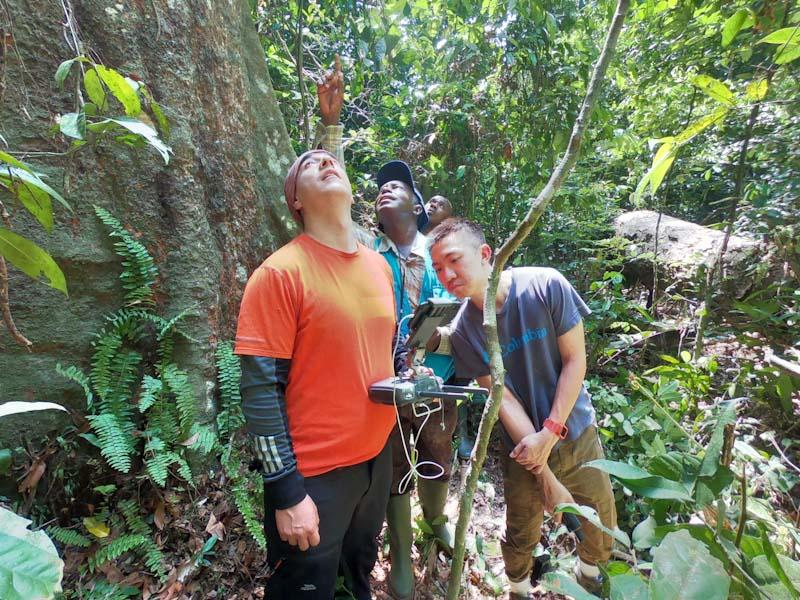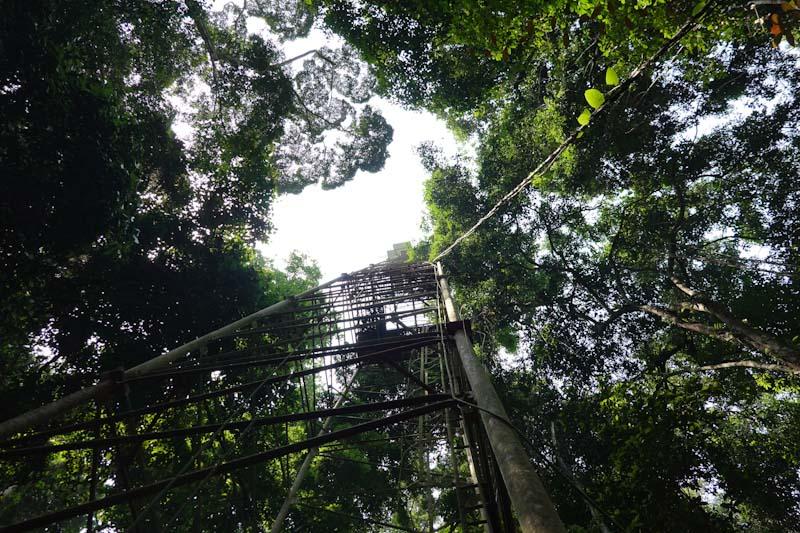All research has a value, and sometimes the findings can be quite surprising. This was brought home to Dr Huanyuan Zhang-Zheng recently.
That fact, coupled with the open-mindedness and the freedom and eagerness of colleagues to collaborate across institutions proved eye-opening to him.
Dr Zhang-Zheng, a Postdoctoral Researcher with the ECI’s Ecosystems programme, and also a tutor for the Williams-Exeter programme at the University of Oxford, wants to share his experience, particularly with prospective students.

The research team in Ghana including in foreground L-R: Dr Jesús Aguirre Gutiérrez; Prof Stephen Adu-Bredu; and Dr Huanyuan Zhang-Zheng
I was coming to the end of my DPhil (PhD) studies and looking for a study that I could turn around quickly. Due to Covid my progress was delayed, and I needed something fairly straightforward that I could get on with to complete my qualification. Following a discussion with my supervisor, Prof Yadvinder Malhi, I originally planned a simple comparison of field measurements of African forests Gross Primary Productivity (GPP) – the rate at which they convert CO₂ into biomass - to model simulations to determine which models perform the best.
The results turned out to be shocking, from vegetation models to satellite products, there is no ‘the best’. Almost all of them seriously underestimate the GPP of West African forests.
The unexpected discoveries would not have been possible if Prof Malhi had dismissed my seemingly trivial ‘quick’ research idea in the first instance. Now looking back at the ups and downs in my DPhil journey, I deeply appreciate how open-minded Oxford scholars are and how this can lead to the unexpected – a key to great science discoveries.”
We discovered that these forests are more productive than previously thought, often outperforming even the Amazon in terms of carbon assimilation. Yet, existing models fail to capture this, underscoring the need for improved data inputs and modelling approaches.
We examined three forest sites, Ankasa, Bobiri, and Kogyae, and the research revealed substantial gaps between field-measured and model-predicted GPP values, with models underestimating GPP by up to 56.3%. Notably, incorporating local data can largely resolve the data-model discrepancies in GPP, shown with a simplified photosynthesis model (P-model) developed by Prof Colin Prentice at Imperial College London.
One of the key components of this study is the utilisation of a minimal photosynthesis model, Pmodel developed by Prof Colin Prentice. The simple structure and coding of the Pmodel make it possible to plug-in photosynthesis traits measurement and calculate a GPP informed by photosynthesis traits, which reported a consistency between traits measurements and GPP measurements.
I also appreciate the wide collaboration available. This is one of the perks that students at Oxford have. Every day there are ample chances to speak with academic visitors, many of whom are the worlds’ greatest minds. The opportunity to meet with future collaborators is such a valuable asset and one I think many students underestimate.
Apart from the Pmodel, there are many other complex vegetation models, which simulate future climate change and inform policy making, for example, through the IPCC report. The study reported that West African forests’ productivity is commonly underestimated by these models. Such findings are highly alarming because this may have hindered global conservationists’ attention to the importance of West African forests. The study also pointed out potential technical reasons leading to the underestimation of productivities.

About the paper
Published in Nature Communications, the paper: Why Models Underestimate West African Tropical Forest Primary Productivity, addresses a critical gap in how we understand and model tropical forests outside of the better-known Amazon basin. The findings have significant implications for how we estimate the role of tropical forests in the global carbon cycle.
Co-authors from the ECI include; Xiongjie Deng, DPhil student; Dr Jesús Aguirre-Gutiérrez, Associate Professor; Dr Eleanor Thomson, Postdoctoral Researcher, Agne Gvozdevaite, Former ECI DPhil student; Sam Moore, former Postdoctoral Researcher; Dr Imma Oliveras Menor, Senior Researcher; and Prof Yadvinder Malhi, Ecosystems programme lead at the ECI and Director of the Leverhulme Centre for Nature Recovery.
The study was funded by the Leverhulme Centre for Nature Recovery, and Africa Oxford Initiative at the University of Oxford and involved the collaboration of the University of Oxford, Imperial College London, and Forestry Research Institute of Ghana.

